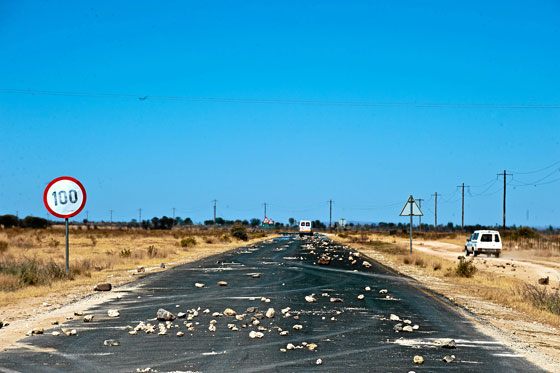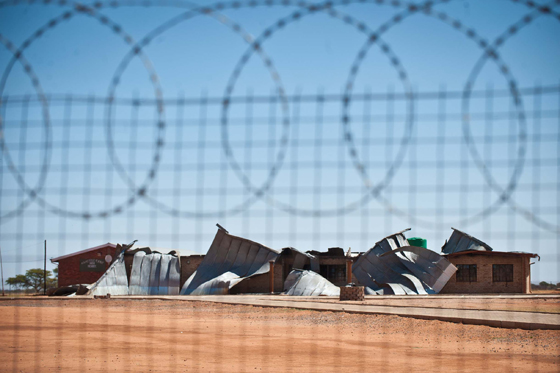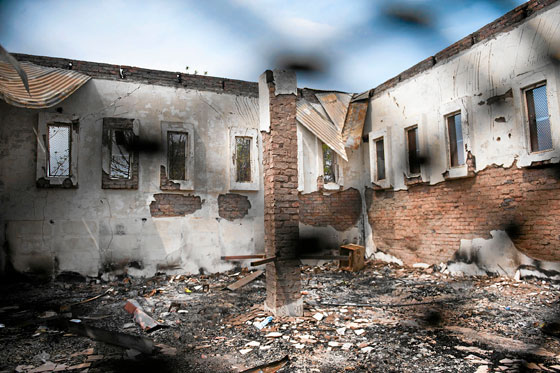Angry Northern Cape communities argue that closing schools is in the learners' best interests.
Thousands of grade 11 pupils in the strike-torn Northern Cape's John Taolo Gaetsewe district will not get to matric next year as protesters vow to keep schools in the region closed for as long as necessary. Yet angry residents who spoke to the Mail & Guardian this week remain adamant their actions are in the best interests of their children.
About 16 000 pupils have been forced out of school over the past four months. Citing a string of "broken promises", striking residents have vowed to keep more than 40 schools in Kuruman villages and the only three schools in Olifantshoek closed until their demands are met.
Gaborokwe Mothusi, the regional chairperson of the South African Democratic Teachers' Union (Sadtu), said the intimidation was keeping more than 400 teachers out of class.
Teachers now fear the closed schools will have no grade 12 pupils next year and that all the other pupils will have to repeat their grades.
"Everyone in grade 11 in these schools will have to repeat," Mothusi said. "So it is realistic that the region, which already has a dismal matric performance record, will have fewer pupils in matric. The closed schools will not have any matrics."
The Kuruman villagers are demanding that the 100km-long road linking their villages to the N14 highway be tarred, and Olifantshoek's striking residents are up in arms over poor service delivery and are calling for the immediate resignation of Gamagara local municipality mayor Maria Diniza.

Protest aftermath (Delwyn Verasamy, MG)
Striking Olifantshoek residents, who include parents with pupils in the schools, said that they were willing to make the sacrifice. "Even if our children go to school in 2020, the schools will remain closed until Diniza resigns," said a parent, who asked to remain anonymous.
"We are doing this for the future of our children. We want them to have a bright future, which they don't have under Diniza's weak leadership."
The parent, who has two children in a local primary school, is one of 30 community leaders in Olifantshoek who was arrested in August in connection with public violence in the area. Teachers were intimidated into staying away, a community library was burned down and Diniza's home was petrol-bombed.
A teacher at Langberg High School, the only secondary school in Olifantshoek, echoed Sadtu's view. "Our fear is that Langberg will not have grade 12 learners next year. Every child in grade 11 will have to repeat the grade, as will the children in other grades. I don't how the striking parents are going to respond to that. What are they doing to a grade one learner who was excited about starting school? Such a child will be traumatised for the rest of their life. How would that child now approach education?"
An overcrowding crisis also looms next year, said Mothusi. "We're now looking at a serious problem of overcrowding, especially in grade R, where the schools have no choice but to take in new learners."
Only half of Langberg's matric pupils are reportedly in the study camp organised by the provincial education department. Parents wanting to send their children to the camp have been threatened with violence.
Many of the affected pupils could simply be lost to education, the principals and parents in the area told the M&G.
"Instead of repeating, some grade 12 pupils will prefer to look for jobs," said one Olifantshoek teacher.
Pupils have been roaming the streets for months, some playing soccer all day, said Putso Visser, a matriculant at Langberg.

Disaffected residents have been blamed for burning down a school in Cassel, Northern Cape. (Delwyn Verasamy, MG)
He said he was not attending the study camp because, "as a community, we have agreed that we will all repeat next year. Those who went there are putting their homes at risk."
In a meeting in Kuruman on Tuesday, Basic Education Minister Angie Motshekga reminded principals and school governing body members that the department did not have a pass-one-pass-all policy. Motshekga asked governing body (SGB) members to lobby communities to allow pupils to return to school.
But the residents appeared unmoved by her appeal.
Frustration was pushing them to take such drastic action, said one.
"We were promised freedom, but we remain in bondages of poverty because Olifantshoek is not developing. All other communities in Gamagara are developing, but we're a town stuck in history. Remove Diniza because she makes promises she can't keep."
An elderly woman the M&G found fetching water from a street tap said: "Our hearts are sore that our children are not going to school and they are missing out. We want them to go back to school."
But the children say they are not doing so because "there is violence", she said. "The strikers say the children should not go back until we have a tar road."
Said a grade nine pupil in Dithakong village: "We want to go to school, but our teachers won't come because they are scared people will burn the school."
ANC members the M&G met in Olifantshoek said the call for Diniza's resignation stemmed from party infighting, but they distanced themselves from the closure of schools. .
"This is an ANC matter. We never wanted Diniza. But the issue of schools, that's a community matter," said Isaac Obuseng, whose view was supported by Shepherd Minnies and Boitumelo Lekgadi. The three are part of a group of residents that was arrested for public violence.
But even ANC members are now afraid of saying anything that might be seen as supportive of the opening of the schools, a resident said. "As ANC members, we can't just say the schools must reopen. Everyone is afraid."
Yster Mokae, a parent and a member of a committee set up to rally community members to the campaign for a tar road, blamed the provincial government, not action by the communiy, for the closure of the schools. "We support education for our children. That is why most of the matrics in the study camp are from [Kuruman] villages."
He said the parents would demand that every pupil be promoted to the next grade. "Our children are home now because of broken promises, so those in grade 11 must go to matric next year. [Motshekga] has told SGB members this will not happen, but the community will demand that it happens."
Sounding distraught over the phone, the besieged Diniza told the M&G she was open to any investigation and would resign only if proper channels were followed.
Diniza denied stifling development in Olifantshoek. "They are talking about issues [stemming] from 1994. Where was I in 1994? I became councilor only in 2006."
Multimillion-rand projects have been put on hold because of the strike, she said. These include a R60-million sports arena and new houses on which work had not started when the protests erupted.
"They are in the pipeline. Money has been approved and tenders completed. But they are now on hold because of the protests," Diniza said.
She accused the protesting community members of using children to settle political battles. People who lost out in the local government elections in 2011 were instigating the revolt, she said.

Olifantshoek municipal library was burned down by residents in August and mayor Maria Diniza's home was bombed. (Delwyn Verasamy, MG)
Barring pupils from school was unacceptable, she said. "We know that some of us won't be able to send our children to university when they matriculate, but let's give them the opportunity to go to school at least."
National education spokesperson Panyaza Lesufi declined to talk about whether the department planned to reopen the schools and Northern Cape education department spokesperson Stanley Stander could not be reached for comment.
The provincial roads department was still seeking funds to allocate to construction in the Kuruman villages, spokesperson Crystal Robertson said.
The department had inherited a backlog when it took over roads construction projects from five municipalities in July last year.
"We're engaging with the national treasury and the mines because we are talking R1.3-billion here," Robertson said. The community was being engaged on the issue.